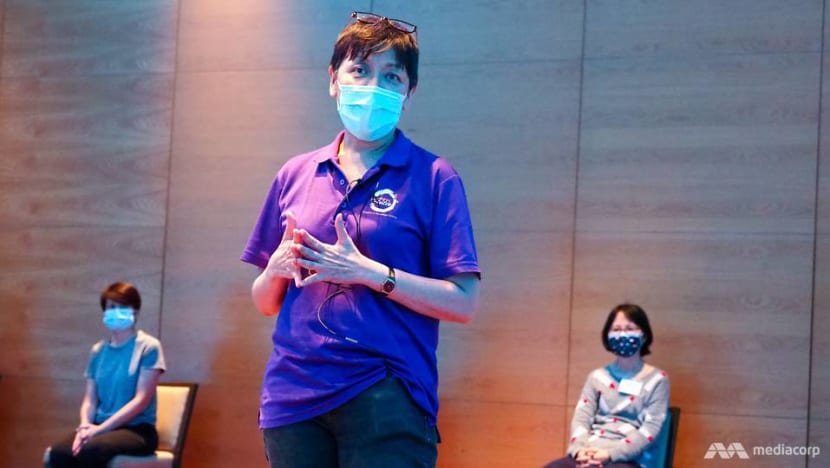SINGAPORE: Minutes into a mindfulness workshop, a participant tears up as she tells the people gathered in the room that she hopes to get help as she feels she is “not doing well” in life.
She apologises for the mild outburst but moderator Associate Professor Angie Chew tells her it’s okay, and an assistant offers a hug.
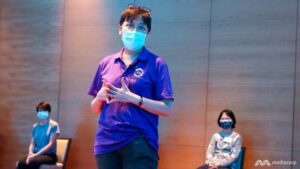
Associate Professor Angie Chew of Brahm Centre conducting a mindfulness workshop on Jan 5, 2021. (Photo: Chew Hui Min)
Of the more than 30 participants at the workshop, a fair number shared that they have experienced sudden changes in their lives, either due to the COVID-19 pandemic or a family member falling ill.
They were hoping to learn techniques to better manage their stress or anxiety at the Mindfulness-based Stress Reduction (MBSR) workshop organised by non-profit organisation Brahm Centre, which started on Jan 5.
MBSR workshops, created by Dr Jon Kabat-Zinn at the University of Massachusetts Medical School in 1979, helps people cope with stress, depression or anxiety. A secular practice, it is now offered in many settings around the world, including hospitals, schools and prisons.
“I suppose (this is) because people have no idea where to go. So this is not just a physical getaway but it’s a mental vacation,” said Assoc Prof Chew. “Because it’s overthinking that causes burnout.”
She told CNA that there have been more inquiries about the centre’s mindfulness courses since the “circuit breaker” period in April, and there is a waitlist for their classes and workshops.
The centre trained more than 23,000 people last year, a three-fold increase from 2019. A large number of these were from corporate workshops, and also from a mindfulness conference in August that saw 5,000 people sign up.
MORE CORPORATE WORKSHOPS
Yoga and meditation studios told CNA that they have seen a similar situation – mindfulness classes, which tend to be in small groups, are oversubscribed.
The Singing Bowl Gallery, which focuses on sound meditation, now holds daily classes due to restrictions on class sizes and increased demand. The number of people who attend its classes each month has increased from 15 before the pandemic to about 40 people.
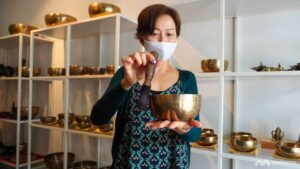
Ms Christina Shiu of the Singing Bowl Gallery demonstrates how to use a singing bowl. (Photo: Chew Hui Min)
Ms War War Lwin Tun of Ohmsantih Yoga said that she used to get more requests to run physical yoga workshops, but last year, the number of meditation and mindfulness workshops for companies went up significantly. She now runs at least four such events a month.
“I think companies also have that awareness now that my employees may be more stressed than before,” she said.
Ms Dawn Sim, director at The Open Centre, which runs mindfulness and mental resilience programmes, said that more people have come forward to take their courses. In addition, the corporate workshops they run have switched from focussing on leadership to being about managing stress and anxiety.
Health Can Be Fun, a health consultancy that helps organise wellness workshops, has also seen the number of mental wellness programmes they run increase about three times in 2020, from one or two a quarter to one a two a month.
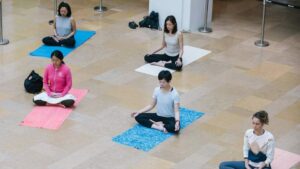
Every Wednesday, SAM will host virtual guided meditation sessions on its Facebook page. (Photo: Singapore Art Museum)
Companies from a range of industries have shown interest in training for stress management, mindfulness and resilience building, and workshops that teach breathing techniques and art-based therapy have proven to be popular, a company spokeswoman said.
“In Asia and Singapore, there has often been a stigma surrounding mental health and seeking help. However, COVID-19 has certainly changed the landscape. Since the start of COVID-19, many companies and individuals experience the impact of poor mental wellness and health,” she said.
WHY THE INCREASE?
The emergence of a new disease and the effects it has had on society and the economy may have something to do with this phenomenon.
The fear and anxiety triggered by COVID-19 and its consequences can be overwhelming for some, said Ms Sara-Ann Lee, a senior clinical psychologist from the Institute of Mental Health (IMH).
“The pandemic has emphasised the importance of mental wellness given that many countries had to enforce policies that required physical distancing among individuals in order to control the spread of the virus.”
She added that many reported feeling lonely, isolated and depressed due to “lockdown” measures in many countries.
In Singapore, the circuit breaker lasted for two months and many employees lost their jobs or had their pay cut, while some businesses struggled to survive despite substantial subsidies from the Government.

One in seven people in Singapore will be experiencing a mental health condition in their lifetimes. (File photo: TODAY/Nuria Ling)
Most people have had to adapt to safe distancing measures and new rhythms as schools and offices shifted to their homes.
Travel restrictions which have stopped people from going overseas for leisure may also have led to the increase in demand for mental wellness programmes, as people have more time in Singapore, some studios said.
MORE HELP AVAILABLE
In October, the Government set up a COVID-19 Mental Wellness Taskforce to tackle the pandemic’s impact on mental health.
Announcing the formation of the task force on Oct 10, which was World Mental Health Day, Prime Minister Lee Hsien Loong said that with COVID-19, more people are facing stresses, pressures and disruptions to their lives and livelihoods.
“Health authorities around the world must not only fight COVID-19, but also manage its impact on the mental health of their populations,” he said then.
The Ministry of Health Office for Healthcare Transformation (MOHT), along with other public service agencies, has also launched the mindline.sg website, which helps people assess their mental well-being and consolidates resources that they can tap to cope with stress. In mid-October, an AI penguin chatbot named Wysa was added to the site.
As of Dec 28, more than 100,000 have used the site, MOHT said.
Ms Wong Yin Li, who heads the youth division of Fei Yue Community Services, said that resources such as mindline can be useful because people can seek help anonymously and in their own time.
“It is very good for clients who need to understand more and feel safer before they can do the next step of going for face-to-face services,” she said.
Practitioners CNA spoke to also suggested that those who want to start practising mindfulness can have a taste of it by turning to mobile apps, before deciding if they want to commit to classes or workshops.
Ms Sim said: “They can start anywhere, anytime … there are lots of good apps around, and if they want more support, then they can sign up with one of the centres. It’s a way of life and they don’t have to wait until they finish that project, or when they resign.”
WAYS TO RECOGNISE AND RESPOND TO STRESS
IMH’s Ms Lee said that in the new year, an increased focus on mental wellbeing is likely to continue as people start to become more aware about these issues and take steps to look after their own mental wellbeing.
“Stress is a normal part of our day to day lives, even more so that the fight against COVID-19 continues. We all need to be able to recognise and respond by developing healthy ways to cope with stress,” she said.
Ms Lee recommends that people control the amount of information they read regarding the pandemic and trust only reputable sources of information.
They should also try to maintain work-life balance despite working from home by setting appropriate boundaries and sticking to a regular work schedule if possible.
“Take care of your body by ensuring adequate nutrition and sleep, coupled with exercise. Make time for self-care activities to relax and unwind,” she added.
Assoc Prof Chew said there are times when it can be hard to manage one’s repetitive thoughts and worries, despite resolving to do so – which is when mindfulness techniques can be useful.
Very often, it’s the inability to let go of what has happened that leads to suffering and negative emotions perpetuating, and having the right “foundational attitudes” can help, she said.
“The foundational attitudes of mindfulness is to be curious so that you are less judgmental; to accept what you can’t change in that moment in time … to be able to be grateful for what we already have instead of letting the mind focus on what is lacking,” she said.

